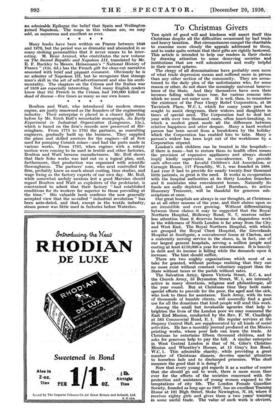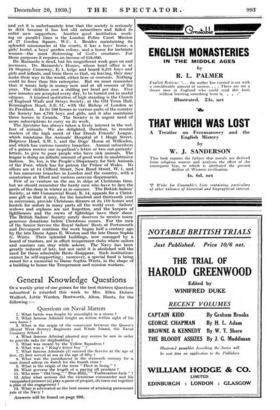To Christmas Givers
THE spirit of good will and kindness .will assert itself this Christmas despite all the difficulties occasioned by bad trade• and heavy taxation. But circumstances compel the charitable to examine more closely the appeals addressed to them, and to make quite certain that their gifts are rightly bestowed. This article is intended to help our readers in their choice by drawing attention to some deserving societies and institutions that are well administered and really helpful in their several spheres.
The clergy of all denominations have probably seen more of what trade depression means and suffered more in. person than any other section of the community. They are accus- tomed to the daily plea of the unfortunates who, for some reason or other, do not share the seemingly universal benevo. lence of the State. And they themselves have seen their incomes falling while taxes rose, for various reasons into which we must not enter now. It is well, then,•to remember the existence of the Poor Clergy Relief Corporation, at 88 Tavistock Place, W.C. 1, which for many years past has sought to assist clergymen, their widows and daughters in times of special need. The Corporation had to deal last year with over two thousand cases, often heart-breaking, in which a modest grant made all the difference between relative happiness and utter despair. Many a hard worked parson has been saved from a breakdown by the holiday which the Corporation has enabled him to take. Many w parson's widow has been kept out of the workhouse by a. Corporation stipend.
London's sick children can be treated in the hospitals—. if there is room—but to restore them to health often means the provision of expensive appliances and always should imply kindly supervision in convalescence To provide. such after-care the Invalid Children's Aid Association, at Carnegie House, 117 Piccadilly, W. 1, was founded in 1888. Last year it had to provide for nearly twenty-four thousand little patients, so great is the need. It works in co-operation with the hospital authorities at its thirty London branches, and it maintains nine convalescent homes. Naturally its funds are sadly depleted, and Lord Burnham, its active Honorary Treasurer, will be thankful for generous sub- scriptions at once. Our great hospitals are always in our thoughts, at Christmas. as at all other seasons of the year, and their claims upon us are irresistible and ever growing. Without differentiating, between these claims :it may be= suggested that the Royal Northein Hospital, Holloway Road, N. 7, receives rather less attention than- it deserves because its stupendous work in the wilderness of North London is far away from the City, and West End. The Royal Northern Hospital, with which are grouped the Royal Chest Hospital, the Grovelands. Hospital at Southgate, a convalescent home at Clacton, and a maternity nursing service in the slums, is, in fact, one of our largest general hospitals, serving a million people and costing at least 1110,000 a year for maintenance. It is heavily in debt and its income is falling while the demands upon it increase. The hint should suffice.
There are two mighty organizations which most of us take for granted, without perhaps realizing that they can no more exist without constant voluntary support than the State without taxes or the parish without rates.
The Salvation Army, Queen Victoria Street, E.C. 4, and the Church Army, 55 Bryanston Street, W. 1, are intensely active in many directions, • religious and philanthropic, all the year round. But at Christmas time they both make special efforts to provide for the poor, the aged and the sick, who look to them for assistance. Each Army, with its tens of thousands of humble clients, will assuredly find a good use for all the donations that kind people will send this week.
Among the small but invaluable agencies that help to brighten the lives of the London poor we may commend the East End Mission, conducted by the Rev. F. W. Chudleigh at 583 Commercial Road, E. 1. His regular services at the Stepney Central Hall, are supplemented by all kinds of social activities. He has a monthly journal produced at the Mission printing works, where poor lads can learn the trade. At Christmas he entertains fifteen thousand children, and he asks for generous help to pay the bill. A similar enterprise in West Central London is that of St. Giles's Christian Mission and VVheatley's Homes; at 15 Gray's Inn Road, W.C. 1. This admirable charity, while providing a great number of Christmas dinners, devotes special attention to homeless lads and to discharged prisoners. Who shall measure the good- that it is doing ?
Now that every. young girl regards it as a matter of course that she should go out to work, there is more room than ever for the efforts of the societies concerned with the protection and assistance of young women exposed to - the temptations of city life. The London Female Guardian Society, founded as long ago as 1807, has an excellent Training Home at 191 High Street; Stoke Newington, N. 16, where it receives eighty girls and gives them a two years' training in some useful trade. The value of -such -work is obvious, and yet it is unfortunately true that the society is seriously in debt because it has lost old subscribers and failed to enlist new supporters. Another good institution work- ing on parallel lines is the London Police Court Mission at 27 Gordon Square, W.C. - 1. Besides maintaining its splendid missionaries at the courts, it has a boys' home, a girls' hostel, a boys' garden colony, and a home for inebriate women—the most distressing of God's creatures. For those purposes it requires an income of £28,000. Dr. Barnardo is dead, but his magnificent work goes on and increases. Dr. Barnardo's Homes, whose head office is at 18 Stepney Causeway, E. 1, lodge and board 8,291 boys and girls and infants, and train them so that, on leaving, they may make their way in the world, either here or overseas. Nothing could be finer than this enterprise. But we must remember that it wants help in money now and at all seasons of the year. The children cost a shilling per head per day. Five new inmates are accepted every day, to be turned out as useful citizens. A kindred institution of high standing is the Church of England Waifs and Strays Society, at the Old Town Hall, Kennington Road, S.E. 11, with the Bishop of London as its President. In its 108 homes in various parts of the country the Society has 4,783 boys and girls, and it also maintains three homes in Canada. The Society is in urgent need of more subscriptions to carry on its work, The Spectator has always taken a lively interest in the wel- fare of animals. We are delighted, therefore, to remind readers of the high merit of Our . Dumb Friends' League, which maintains the Animals' Hospital at 1 Hugh Street, Belgrave Road, S.W. 1, and the Dogs' Home at Willesden, and which has various country branches. Annual subscribers of a guinea receive one in-patient's letter or two out-patients' letters, to give to poor people who have sick animals. The league is doing an infinite amount of good work in unobtrusive fashion. So, too, is the People's Dispensary for Sick Animals of the Poor, which has for patron the Prince of Wales. Its offices are at 14 Clifford Street, New Bond Street, W. 1, and it has numerous branches in London and the country, with a sanatorium at Ilford and various caravan dispensaries. Few of us venture on the sea in ships at Christmas time, but we should remember the hardy men who have to face the perils of the deep in winter as in summer. The British Sailors' Society, at 680 Commercial Road, E. 14, appeals for a Christ- mas gift so that it may, for the hundred and thirteenth year in succession, provide Christmas dinners at its 110 homes and hostels for sailors in many parts all the world over. Sailors' widows and orphans are not forgotten, and the keepers of lighthouses and the crews of lightships have their share. The British Sailors' Society surely deserves to receive many generous donations before Christmas comes. For the men of the Senior Service the Royal Sailors' Rests at Portsmouth and Devonport continue the work began half a century ago by the late Dame Agnes E. Weston and the late Dame Sophia G. Wintz. Their splendid buildings, now managed by a board of trustees, are in effect temperance clubs where sailors and marines can stay ,while ashore. The Navy has been greatly reduced of late, but not until it is abolished will the need for these admirable Rests disappear. Such institutions cannot be self-supporting ; moreover, a special fund is being raised for a memorial to Dame Sophia Wintz, in the shape of a building to house the Temperance and mission workers.







































 Previous page
Previous page